#Deviance
Explore tagged Tumblr posts
Text
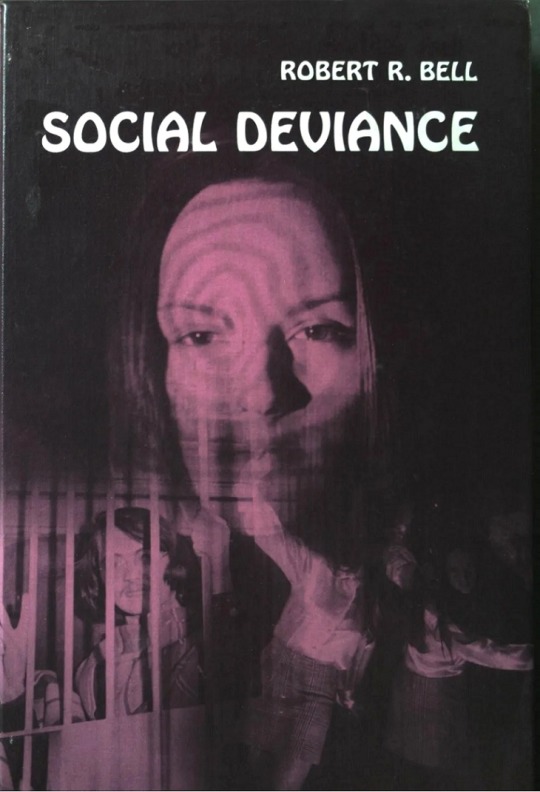
Robert R. Bell - Social Deviance - Dorsey Press - 1971
#witches#deviates#occult#vintage#social deviance#social#deviance#psychology#dorsey press#robert r. bell#1971
166 notes
·
View notes
Text
Jenny Holzer ("Truisms") + Masaaki Nakayama (Fuan no Tane) + Alexander Bruce (Antichamber)
Vivid yet clinical narrative voice which mostly acts as a font of unsettlingly compassionate insight
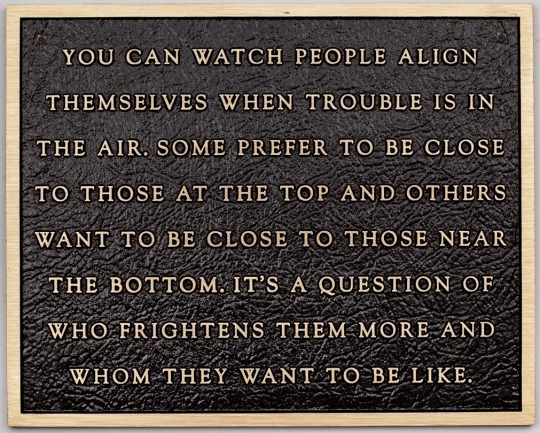
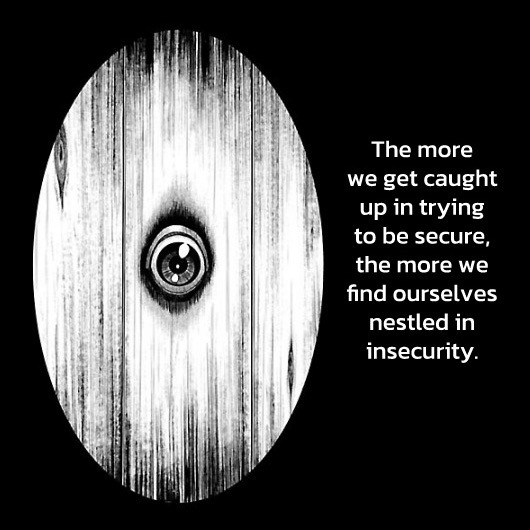


#I've just reacquainted myself with The Survival Series which I encountered in some art museum when I was quite small and never left me#jenny holzer#antichamber#fuan no tane#signs#deviance#caring is punk
10 notes
·
View notes
Text
Watched Deviance/离经叛道 (lí jīng pàn dào) , produced by 池夏 Chi Xia, lovingly translated by douqi (heaven-sent baihe media translator) on YouTube and oooprorjfhd deviance indeed but also love. Very much Mädchen in Uniform meets Bingqiu (at least to me, who knows both of those things but not all things lol I'm indeed biased in perspective)
Baihe short filmmakers are just on a different level
But also... Fuzi as an older alternative to Laoshi needs to be utilized more in various fandoms...
#my text#baihe#deviance#li jing pan dao#chi xia#svsss#tagging it just bc i connected it to it#but for real douqi's yt channel is a blessing unto this wretched earth for baihe fans pls look at their work and kowtow in awe
6 notes
·
View notes
Text
Secular Easter themed academic discussion:
Would we define Jesus’ radical acts as defiance or dissent?
#deviance#dissent#counterculture#academia#academic#nation of rebels#heath and potter#student#student blog#college#university#higher education#studyblr#education#thought daughter#theology#christian history#liberal christianity#communications#humanities#philosophy#liberal arts#Judaism
4 notes
·
View notes
Text
Waste
You and I have something to hide
In this old town, the rot’s a glut
That fuzzes us. Drinks the juice that flows.
Easy to deride, to cut the nose
Shall we still stay all wrapped up?
In nonsense crap I try to map
the new old news, my future views.
Strapped or sapped, I’d tap no doubt
If I could pull my finger out.
And what’s to keep in you and me?
A rage, a right, we won’t give in without a fight
We know to squander would be easy
Squeeze my reason in this city -
Whisper it soft away from light.
When I was young I bit the lemons
Licked and drank and sucked them, down
Citron Pressé my drink of choice
And now I start to raise my voice.
The uncertain smiles with which we strain
Take miles and money to maintain.
And all the while, in piggish pearls, in dirty rain
I’ll tell you a secret I can taste
That you and I won’t go to waste.
#poetry#friendship#creativity#rage#defiance#stress#london#minimum wage#poverty is ineffably wonderful life is worth living#life#angst#deviance#we shall overcome#poet#writing#rhyme#judge me if you dare#my writing#aspiring writer#aspiring author#spilled ink#creative writing#writers on tumblr#poets corner#literature#poets on tumblr#verse#original poem#original poetry#awful poetry
9 notes
·
View notes
Text




Deviance explores the thrill and risk of breaking from order and convention. These figures—Chaos, Bedlam, Mayhem, and Mischief—express the freedom and danger of veering from the norm. Each image reflects how deviation can bring liberation or destruction, illustrating the delicate balance between rebellion and responsibility.
If unpredictable emotions or behaviors are becoming hard to manage, consider talking to someone you trust. Whether through conversation or professional support, you are never alone—help is always available.
5 notes
·
View notes
Text
KK3: Social control theory
+ in Nimona (again)
Deviance can be defined as diverging from acceptable or usual standards, as known as norms. These are socially acceptable things within society, whether formally or informally accepted. Travis Hirschi's social control theory centers around the idea of social bonds, suggesting that deviancy stems from the absence of these relationships and a lack of social control. The more distanced someone is from society, or the lesser bonds they have towards it, the more likely they will be to engage in deviancy, as they lack any influences that would drive them away from this behavior. These influences may also present as positive or negative sanctions, an example being facing judgement from your peers when acting out. The four key concepts within this theory are belief, involvement, commitment, and attachment. When present, social control can be seen, preventing deviance. A positive example within modern society would be the granting of public awards, especially towards “heroes”, such as the Carnegie Medal which is given to those who risk their lives to save others. This encourages and rewards good behavior that supports social norms and endorsing positive beliefs, which further expresses social control within Hirschi’s theory.
This idea of control also carries on into "Nimona”, being a key part within the film. Their authority, known as the Institute, has control over the laws and media, using these to affirm and maintain what is acceptable within their society. A major part of the film would be the news stations, as the Director (the leader of the Institute) utilizes it multiple times, enforcing negative sanctions towards those who are deviant and broadcasting it for all the citizens to see. She would broadcast Ballister and Nimona's wanted posters, publicly shaming them and allowing for all to see what punishment their crimes faced as well as instilling specific beliefs into the people.

The people within the walls have no other source of information, relying solely on whatever the Institute chooses to show them. In this, they have complete control over what they see; in this the Institute can manipulate how people think. Therefore, they can enforce the social norms, values, and encouraged beliefs, discouraging deviance.


Belief is a key part within the film "Nimona", as the citizens and authorities work hard to maintain their centuries-old traditions and values. They have a strong sense of what is right and wrong, declaring monsters and criminals as deviant and driving them out, saying that they are a threat to what they believe to be “our very way of life” (1:19:08).

This expresses the strong views upheld within the people. The citizens within the walls all endorse these beliefs, quite passionately at that, expressing them and upholding them in everyday life. In this, they fall into line and keep to their values, conforming rather than being deviant. For example, they believe that it is important to follow the law of Gloreth (the first leader from one thousand years ago), keeping monsters out and knights noble blooded. They are further rewarded for conforming to these beliefs, being called a "hero if they drive a sword into the heart of anything different" (51:08), discouraging deviance in the form of monsters (or really anything that is different from them).


Those who have a strong belief in this follow these laws throughout their life, unlike Ballister and Nimona. Both had doubts about these beliefs and less passion for upholding them. In this, the concept of belief was absent in their lives, resulting in the breaking of the laws and expressing deviancy. This supports Hirschi’s theory, since as suggested, the lack of beliefs made deviancy more likely. They had less morals or values to lead them towards what was generally accepted as “right”, leaving them to indulge in deviant behavior in the form of crimes, such as destruction of property, vandalism, and treason.


Another major part of the film would be the concept of attachment, and how it is explored through Nimona's character. Throughout her life, she has been outcasted from others with no family or friends to support her. In this, she has no one to influence her life or care about regarding the opinions or judgement of others, nor any attachment or connection to society. This only changes when she meets and befriends Ballister. Before he enters her life as one of her only friends, she has no morals, as she graffities on walls, fights with knights, and destroys monuments to the noble. Yet as they bond, she faces his criticism and starts to accept Ballister's beliefs and morals as her own. Not only does he directly influence her values, but in having him in her life she has someone who she cares about, and in turn, she cares about his opinion of her. This encourages her to deter from the deviant behavior that she knows he doesn't approve of, and as to avoid sanctions such as scolding or grounding, she conforms to what is acceptable, earning his praise and relationship as a friend.

"Nimona” as a film endorses Travis Hirschi's social control theory, being an example of how the four concepts of belief, attachment, involvement, and commitment can help prevent deviancy and encourage social bonds as well as allowing for citizens to be connected to each other and their society. Utilizing Nimona's character arc, the film shows how the lack of and presence of relationships can majorly change people's behavior, as she grows from a criminal to a friend. Yet "Nimona” also expresses and critiques the dangers of the abuse of power within the authorities regarding social control. The Institute controlled the laws and sanctions, enforcing these over the citizens. In theory, this shouldn't be a problem, but the complete control and power that they held allowed them to abuse their role, using the media to manipulate their civilians into conforming to what they deemed socially acceptable behavior. The Institution's power over the laws and news is alike to our own government's authority, with each sanction or reaction being directly controlled, as is what they choose to show the population, and as a result, there is total control over what is regarded as acceptable within society. Though this theory is true, finding that deviance can be caused by the lack of connection, especially to society, the enforcement of social controls and sanctions can become abusive as seen in the film. This can then be applied to a smaller scale, such as within families. Usually, the sanction within a household would be discipline by a parent or guardian, but just like the government these sanctions can border on abuse. It's important to realize this, as the enforcement of control and presence of sanctions can lead to authoritarian ideals. "Nimona” expresses a bad execution of Hirschi's theory, reminding people of what to avoid.
2 notes
·
View notes
Text
Outrageously Normal
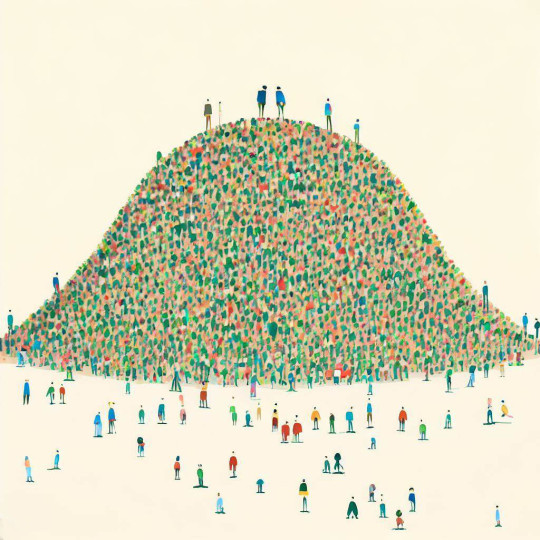
What is normal? And what is outrageous?
What do we really mean by deviance?
Does wanting someone to spank you bottom until it’s pink and sore make you deviant, or excitingly adventurous and alluring? To a mathematician deviance is an objective measure, not a moral judgement, representing how different a particular characteristic is from the average of every known occurrence.
If you were the only individual in the whole world who craved a smacked bottom, it might indeed seem rather weird to anyone you confessed your secret. Yet what we call deviance is really a degree of novelty, the likelihood of anyone encountering it before. Every subsequent time you discover someone who also likes smacked bottoms, the less weird and deviant your interest seems.
Previously, I’ve talked about why it’s important to be erotically curious, to actively explore our own fantasies, and ask questions about what turns us on. But it's also useful to be aware that we seek answers at two different levels of our minds, a higher rational level, and a lower more fundamental emotional one.
Typically when we ask our rational minds a question, we receive an answer through our inner voice in the form of words and ideas. But if we ask our rational mind an emotional question, sometimes we'll receive an answer in the form of awkward feelings that doesn't seem to make any sense at all.
When we need to query the more primal parts of our mind, about base needs like drive, desire, and sex - we receive answers in the form of emotions rather than words, which then need be interpreted. Everyone is familiar with that kind of introspection whenever we ask ourselves: how does this situation make me feel?
It can be difficult to understand our true feelings about important matters. Fishing our true stories and concerns from our unconscious minds is a skill in itself that can take a lifetime to master. It turns out wisdom isn't a knowledge of facts, it's an awareness and understanding of our feelings.
So many of our questions about sex are really requests for reassurance, hoping to know whether what we're doing is right or wrong. Whether we're normal or weird.
What our rational mind knows is the result of years of assimilating the average opinions of a staid and risk-averse culture. So if we ask our rational mind a primal question, the chances are we'll feel we're doing something quite outrageous. Daring to break the mundane conventions we've been taught to obey can often make us feel rather ashamed.
That's why it's so important to encounter transgressive points of view. We need to hear others talking about how they pleasure themselves, how they express their sexuality, and the fetishes they're no longer embarrassed about. That's why I'm always so thrilled when readers choose to share their fantasies with me.
Decorum prevents us from surveying strangers on the street for the details of their deepest desires. Fortunately erotic content, such as blogs and stories, helps to show us just how huge the spectrum of human sexuality really is, allowing us to develop an informed picture of what really turns others on.
Human sexuality is a bell curve, just like most collections of characteristics are. In these kind of "normal" distributions the horizontal axis reflects how far something is from the average, whilst the vertical axis depicts its frequency, like how many people in a given population are into some sexual activity, for instance. Hence the most popular activities form a big bulge in the middle, with the less common ones becoming the outliers at the edges.
There are two lessons to take away from this: frequency isn't a measure of acceptability, and deviation from the average isn't either. It's perfectly acceptable to have tastes that aren't shared by many others, or to lie far from the mainstream, whether it's music, literature, fashion, or anything other aspect of life. In fact, it's essential for our cultural diversity, otherwise our society would be very boring indeed.
As the online realm becomes ever more prudish, having permissive places to post is increasingly vital. Our culture needs platforms were adults can talk about adult things. We all need reassurance we're not as deviant as we fear we are.
This blog exists because sex-positivity matters. It is important we encounter experiences outside the norm, even if it's only to read about them. Such exposure gives us courage to step outside the boundaries of being 'proper', and permission to express our own individuality. We all have the right to be adventurous, even to be outrageous, and choose our own favourite flavours of joy.
9 notes
·
View notes
Text
Compliance, per the two main approaches to medical sociology
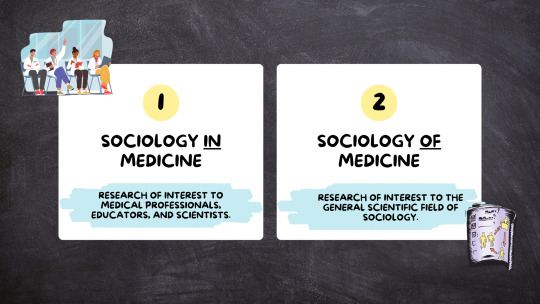
Sociology in medicine is research that’s of interest to medical professionals, medical educators, medical scientists— things that are important to medicine as an institution.
Sociology of medicine tends to be research of interest to the general scientific field of sociology, not only sociologists who study matters of medicine, health, illness, healthcare, and disability. Importantly, it is not that medicine is simply disinterested in sociology of medicine, the institution of medicine sometimes has a vested interest in silencing or arguing against sociology of medicine. Sociology of medicine may not be useful to medical professionals, but if, for example, sociology of medicine is critiquing medical practice, as is often the case, it might move beyond useless to being perceived as offensive.
To further explore the difference between sociology in versus of medicine, let’s take the issue of compliance.

From the medical perspective, patient compliance is vital for successful medical practice and treatment. if your patient is not listening to you–for example, if they’re not taking their medication, and that medication is supposed to get them better, than you are going to have a much more difficult time treating that patient, and thus, a much harder time doing your job, than if the patient “complied” with your treatment plan. Same thing if your patient won’t have surgery. Well, if operating is the way that you do your job and the patient refuses, you cannot do your job as well. So, sociology in medicine would examine compliance with this medical perspective in mind. Sociology in medicine might investigate the barriers to patient compliance, and they might ask about these barriers in terms of patient behavior, asking something like "why are these patients non-compliant?" with the goal of identifying things that can be addressed to help patients better comply, so that medical professionals can have better chances of success when trying to do their jobs.
Now, moving to sociology of medicine—the greater field of sociology is interested in issues of power and inequality. When examining compliance in terms of power and inequality, we might look at something like physician control over patients, which would contribute to areas of sociology beyond medical sociology, such as the larger sociological literature on deviance and social control.
From this perspective, physicians offer something that patients cannot obtain on their own—prescription medications, surgery, imaging…these are all things that are considered both illegal and dangerous when obtained from non-credentialed entities. This means patients must be compliant to avoid severe consequences, like physical injury, disability, or even death. Healthcare providers hold power to help people feel better when they have few, if any, safe alternatives.
Instead of looking at compliance as inherently positive or necessary, we can critique the concept, and most importantly, the continued endorsement of compliance as “positive” and “necessary” by credentialed actors in medicine. So, sociology of medicine, similarly to sociology in medicine, may examine barriers to compliance, but because it does not assume compliance is necessary or helpful to the patient, it leaves room to explore the patient experience. Sociology of medicine can explore things like mistrust of medical professionals, experiences with bias and discrimination in the clinical encounter, and the patient’s understanding of a potential treatment as helpful versus their belief that the treatment is useless (independent of the science on said treatment’s effectiveness).
So, while sociology in medicine and sociology of medicine might both be interested in the question of “why do patients become noncompliant,” sociology in medicine might approach that question with the intent of identifying something that will lead to increased compliance, whereas sociology of medicine may approach the question in terms of medical harm, so not taking the assumption that compliance is positive, instead, taking the more skeptical view that compliance might be an exercise of power on the part of the healthcare provider over the patient and focusing on issues like the potential for patterns of exploitation and/or harm of certain groups of patients with shared characteristics. Sociology of medicine might ask whether healthcare providers, because they are powerful, are inherently good or right. Sociology in medicine would probably not ask this question at all, instead assuming the answer to be "yes"
youtube
#sociology#studyblr#phdblr#social science#medblr#health science#research#paradigm#medical sociology#sociology of medicine#sociology in medicine#compliance#power#inequality#deviance#social control#medical sociology 101#Youtube
3 notes
·
View notes
Text
"Kill the King, Crown the Witches"
On April 24, 2009, I attended a Patrick Wolf concert in St. Petersburg. For those who aren’t familiar, Patrick is an English musician who is difficult to pigeonhole in a specific genre. He plays a wide variety of instruments and has a rather devoted fan base, which includes me. I considered myself very lucky: this was his first concert in the city and the venue was a short five-minute walk from…

View On WordPress
4 notes
·
View notes
Text
I just watched How To Blow Up A Pipeline a few days ago and have been gathering my thoughts about it. It's an unusually low-key heist movie, but I think that serves it better than the more stylised and conventionally cinematographic version I was expecting from a title like that.
Heist plots are heavily formulaic - identify the target, gather the team, establish and carry out the plan, unexpected third-act obstacle that either has to be addressed by changing the plan on the fly or surprise! the audience was also being conned and there was a secret plan for this contingency all along. (C.f. every episode of Leverage ever.)
Nearly universal but not technically part of the formula: everyone is fabulously wealthy/glamourous or a notorious expert criminal pretending to be, which provides layers of fantasy/exoticism which remove the story from the audience's mundane experience in lieu of "don't try this at home". This is what I was expecting. How To Blow Up A Pipeline pointedly does not do that. There are like two characters who even have a college education, neither of whom are the self-taught chemist. All the tools are homemade. It very much wants to portray activism/terrorism as something ordinary within the capabilities of the average person. Every other heist film I've ever seen is James Bond and HTBUP is George Smiley. I want to nickname it Rich-man, Poor-man, Beggar-man, Thief but nobody will get this joke but me.
Even more universal, but also not technically crucial to the formula, apparently: a villain?! Heist protagonists are by definition roguish antiheroes, so there's usually quite a lot of effort put into making sure they're up against a moustache-twirling puppy-kicker to make sure the audience's sympathies are in the right place and provide catharsis in their humiliating defeat. The antagonist here is The Oil Industry, and it would be really, really easy to incarnate it as a sneering corporate executive, but there are actually no obviously antagonistic characters at all for like two-thirds of the movie. (Which makes sense - trying to pass themselves off as oil workers would be neither appropriate nor practical, so the plan depends on simply not being caught.) Instead, it exists as an oppressive force manifesting in the background of almost every scene, through coiling pipes, burning chimneys, and metronomic pumps. It's like a man-vs-nature heist movie?! I'd compare it to stealing-fire-from-the-gods, except that's exactly what it doesn't do, because there are no gods to personify the forces of "nature" and neither are any of the "thieves" a larger-than-life Prometheus.
This has some other effects as well. Not providing a villain to hate also makes them unavailable to be criticised as either slanderous or caricatured (avoiding that catch-22 entirely), though it also deemphasises their individual agency. Consequently, most of the tension doesn't come from "are they going to be caught" so much as "are they going to blow themselves up before they accomplish anything", and I'm not sure I really felt that consistently; but then, for the same reason, audience sympathy instead comes from the characters discussing and arguing about their motives and ethics. Which the heist is kind of just the delivery mechanism for, and that seems appropriate to what I've heard about the book. I think I'd need to watch it again to decide if it was "good", but I thought it was brilliant and original and compelling which are really more important to me anyway.
2 notes
·
View notes
Text
| Love becomes deviance in the month of June.
6 notes
·
View notes
Text
A Phase of Holi
From Gwyneth: My darlings, we are at the Great Faire! Of all the events we attend each year, our favourite is the Fantasy Faire, where we meet friends old and new, wonder at the myriad Realms, and of course, shop. Greetings from Holi Now, there is an expectation, I suppose, that we will see wonders at the Faire. But the overpowering aura that is Holi made even the most jaded of the Shining…
#Alia Baroque#Arkona#CKit Falconry#Deviance#Eventyra#Fantasy Faire#Fantasy Faire 2025#FF 2025#Find the Fish#Holi#Illusions#Legacy#Lelutka#Lumae#On a Lark#Raven Bell
0 notes
Text
KK1: The Relativity of Deviance
+ in the perks of being a wallflower The perks of being a Wallflower is a film depicting the high school experiences of main character Charlie and his group of friends, showing how their differing personal lives and identities bleed into their school atmosphere as many of them deviate from what is considered normal or acceptable by both their peers and teachers. Many times, Charlie is seen as an outcast or loner, in his school, family, and even within his friend group. Throughout the film there are moments where his behavior is accepted by those around him, even if it seems to deviate from common or general social norms, expressing the relativity of deviance.

Deviance is defined as “the fact or state of diverging from usual or accepted standards, especially in social or sexual behavior.” (Oxford Dictionary) It is defined by the social norms in society, the expectations on how people should behave or be. In this, it is a sociological concept; it is relative. This means that it is forever changing, being affected by subjects of time, culture, context, age, and socio-economic status.
Deviance is often explored throughout the film with the main cast, a key example being in Patrick's character. He is openly gay and cross-dresses in multiple scenes throughout the film as he plays a queer character in a theatre project. Being gay or queer is frowned upon in many societies even in modern times. This is seen in the film as Patrick is bullied for his sexuality, being called slurs and a “f*ggot” (1:11:21), and because of this, his boyfriend tries to avoid him in public to escape the judgement of his peers. He insists that he “doesn’t want anyone to know” (24:34), being ashamed and fearful of the reaction of the other students at the school as well as his family, saying that “his dad would kill him”, and that “he was going to hell”. (29:05) They are breaking away from the heteronormative code of society, that being heterosexual or straight is the norm and being gay isn’t, it’s deviant. Additionally, not only does his relationship divert gender norms but his passion in theatre does too. Patrick is and acts in a way that a traditional man doesn’t. “Normal” men in the eyes of society are expected to dress masculinely and have a wife and kids, yet Patrick does not follow these expectations.

Another example of deviancy explored is the consumption of illicit drugs, such as marijuana and LSD. The recreational use of these drugs is considered deviant within society and therefore unacceptable behavior, being against the law. This is seen in TPOBAW, as law enforcement can be seen getting involved as Charlie gets found by the police whilst he is using LSD. “Normal” people do not engage in this behavior, as the expected social norm is to stay a healthy law-abiding citizen. Drugs are often associated with unhealthiness as there are major risk and health factors to overdosing or commonly consuming drugs. In this they are also equated to a lack of decorum or class, as derogatory terms like “meth-head" or “druggie” are used to describe drug users, often being associated with people in lower economic classes.

Still, deviance is a relative concept, as in different contexts behavior that was once thought of as deviant may be seen as acceptable or normal. In TPOBAW, the very same example of Charlie's drug use can be applied. When he was out on the street, it was not acceptable to the people around him, especially not to the law or his parents. This contrasts with the scene earlier, where he attended a party with other teenagers at his school. Along with the other people in attendance, he drunk alcohol and took drugs on multiple occasions. For the people at the party, this type of behavior was not only normal but acceptable, and the majority of the people present were partaking in this “deviant” behavior. They didn’t consider it serious, cracking jokes even, saying he was “baked like a cake” , 24:40 (Slang for being high off marijuana). In this context, his drug usage was not seen as deviant to his peers. This is often true in real life situations as well. Many teenagers will smoke or consume drugs, and to their peers this is generally seen as not out of the ordinary, yet their parents or other adults in their life will have a wildly different opinion. This further expresses the notion that deviance is a social construct, an idea that has no clear definition. The idea that deviance is the diverging from social standards does not consider the differing views of the population. What is thought to be standard in one context (setting/time) may not be in another, especially when considering the many groups that make up the society, making it situational or contextual.

#deviance#sociology#school work#drugs mention#substance abuse#tpobaw#the perks of being a wall flower#year 11 sociology
2 notes
·
View notes
Text
"what's attainable for most people is compartmentalisation rather than anonymity"
Oh good, a practical application for my preexisting skillset
If you’re in the US (or in correspondence with people from there) and you haven’t been paying attention to this issue… it’s time to start.
3K notes
·
View notes
